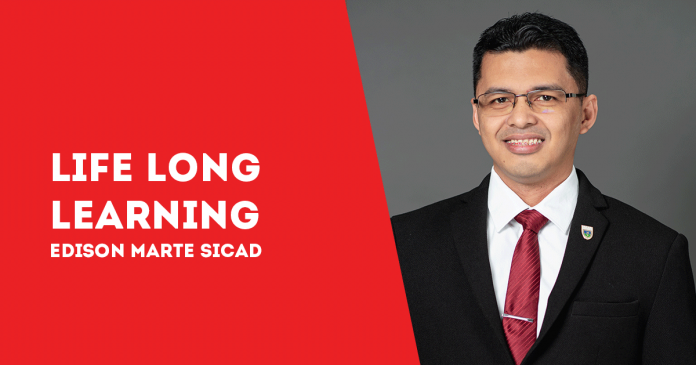
BY EDISON MARTE SICAD
That night, God appeared to Solomon and said to him, “Ask for whatever you want, and I, your God, shall give it to you.”
Solomon answered God, “… Give me wisdom and knowledge, that I may lead this people, for who is able to govern this great people of yours?”
Then God replied, “Since this is your heart’s desire and you have not asked for wealth, possessions, or honor, nor for the death of your enemies, and since you have not asked for a long life but for wisdom and knowledge to govern my people over whom I have made you king, therefore wisdom and knowledge will be given you. And I will also give you wealth, possessions, and honor, such as no king who was before you ever had and none after you will have.” – 2 Chronicles 1:7-12.
THE OTHER version of this would be the genie-in-a-bottle type of story. As played out in varying degrees in movies, books, and conversations, the outcome of the story would be dependent to the person who rubbed (mostly by accident) the lamp.
In some adaptations of this genie-in-a-bottle plot, the twist or the interesting part would be the consequences of the granted three (3) wishes.
For sure, to have anything we want—at an instant—without a sweat, is indeed life-changing. The only question is if the change would be for the better or for the worse. The very idea of being able to achieve our most coveted goals is, to an optimist, the innate potential of life; but to a pessimist, it is nothing but wishful thinking, a childish activity: “What do you want to be when you grow up?”
It is indeed possible to make your dreams come true. But there is a catch, a wrinkle: before your wish can be granted, to receive what you have asked for, you first need to work (really) hard despite the uncertainties along the way. Effort—even failure—is essential in your success story. Do not rely on motivation—be disciplined. You must have the ability to withstand long periods of suffering (mostly in silence) without losing sight of your goal. To give more positive energy to your life, you must not give in to self-pity.
We may admire an athlete for reaching the finish line. But what makes it a success story is the overcoming of the (unexpected) difficulties, the training done without the presence of supporters, and the suffering in solitude. An athlete must be able to trust the process despite the lingering fear of losing.
You can be this athlete—or you can choose to be just a spectator. Regardless, you are the one writing your story—unless you are allowing others to do it for you.
But there is another way of knowing how a person is “writing” the story of his or her life. Be aware of your conversations, the usual choice of words, and the approach to daily occurrences. Your choice of words can make or break you in the long run.
What I learned from my own conversations and with others:
1. If you are looking for something to complain about, you will surely find one.
There is this person who would often be late in reporting to work. The moment this person enters the office, this is what you will always hear: “Grabe ang trapik!” This claim will be supported by valid excuses: it is raining; it is hot; the driver is slow; the auxiliary is an idiot; too many passengers; very few jeepneys; complaining, finding fault, and blaming others ad nauseam.
2. if you are looking for something to be grateful for, you will find it.
Then, there is this person who avoids the traffic jam by getting up early. This person is thankful that a passenger can now ride in an airconditioned bus. In a sense, this person does not only enter the office, for this employee is the one who opens the office, being the first one to arrive (almost every single day).
3. Anything can either be an opportunity for improvement or an excuse for mediocrity.
By nature, is there a limit to what a man or a woman can achieve? What is it that you can actually do but you are not doing? How is fullness of life defined? Or attained?
As an example—to an extreme—a person has the capacity to kill another person but would rather choose not to do so. And there are those who have chosen to be great despite personal tragedies. Some dared to do what seems to be humanly impossible—and succeeded—like the four-minute mile run of Roger Bannister. Others fought for their dreams, while some surrendered to depression. You can be an oppressor, or a willing victim. In truth, you can be a grateful winner or a sour loser.
You can decide to be: a straight A student or not; a good example or not; a true leader or not; financially successful or not; responsible or a faultfinder. The problem is the choice: you can choose to live your life aiming to achieve a worthy goal; or you can just stay the same and be contented with your pathetic existence. To be or not to be.
Some things are given to us to improve our lives: blessings, opportunities, even our very problems. And some things that we have could somehow destroy us: comfort, power, even our so-called abundance in resources. And no one really knows if we deserve all we have asked for and received.
In man’s searching for the great formula of a successful life, in your solving of life’s problems, never forget that you are part of the equation.
Again, the devil took him to a very high mountain and showed him all the kingdoms of the world and their splendor. “All this I will give you, if you will bow down and worship me.” – Matthew 4:8-9./PN



